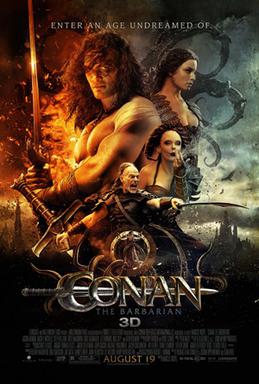 With this review, I consciously renounce all right to any respect as a film critic. I loved Cowboys and Aliens, which right-thinking people seem to despise, and now I’m going to admit to the world that I enjoyed the new Conan the Barbarian, which everybody except me and a few Facebook friends seems to loathe.
With this review, I consciously renounce all right to any respect as a film critic. I loved Cowboys and Aliens, which right-thinking people seem to despise, and now I’m going to admit to the world that I enjoyed the new Conan the Barbarian, which everybody except me and a few Facebook friends seems to loathe.
I’m going to start by moving my recommendation, which I usually leave for the end of the review, to the beginning. The good things I’m about to say about Conan the Barbarian should not be taken as an endorsement for most of our readers. This movie earns its “R” rating. There is much violence, and enough graphic, special effects-enhanced gore to please Odin’s ravens. Also considerable female nudity, often in situations involving bondage. I think this was a major error on the part of the filmmakers. They could have made a movie just as good without voluntarily reducing their paying audience through shock techniques and salaciousness.
On the other hand, the “R” rating is not inconsistent with the original material.
I approached Conan the Barbarian with something less than low expectations. I mistrusted the re-boot project from the first, and Michael Medved, whose opinion I respect, hated it. So I was pleasantly surprised when, somewhere along the way, I realized I was enjoying the show.
Synopsis: The movie starts with a mostly contrived account of Conan’s youth (his birth on a battlefield comes from the original Robert E. Howard stories; the massacre of his village does not). Conan’s father is murdered by Khalar Zym (Stephen Lang), an evil wizard who wants to rule the world. Conan’s father had possessed the final piece to an ancient mask which granted unlimited power to its wearer. Once the mask is filled with the “pure blood” of a descendant of the ancient Acheronian necromancers, its power will be triggered.
Jump ahead about 15 years, and we find Conan the co-captain of a pirate ship, liberating slaves in a merchant town (a very odd occupation for a pirate, in historical terms). A chance meeting with one of the villains who destroyed his home puts him on the trail of Khalar Zym. Meanwhile Khalar Zym is planning an attack on a monastery, guided by the magical powers of his daughter Marique (Rose McGowan), whose enhanced senses allow her to identify it as the hiding place of Tamara (Rachel Nichols), the pure-blood descendant they’ve been searching for (apparently unknown to herself. She is also apparently unaware that members of female religious orders are called nuns, because she refers to herself as a monk. I realize it’s not the Christian religion, but I refuse to believe there can be such a thing as a female monk). Tamara flees the attackers, Conan chases the attackers, and you can pretty much predict how the story will progress from there.
I think my chief argument with those who pan this movie is that most of them compare it unfavorably to the original 1982 John Milius film. And that’s probably the heart of the matter, because I’ve never much liked that movie. I thought it wanted to be everything except a Conan story. It wanted to be a samurai movie. It wanted to be The Magnificent Seven. It was doing hommages left and right, when I just wanted Robert E. Howard’s barbarian, and I didn’t see much of him there.
I never liked Arnold Schwarzenegger in the role, and I didn’t like the way the writers interpreted the character. Conan was not a samurai. He was a visceral, uncomplicated man whom Howard patterned after cowboys and wildcat oil men he knew in Texas. Conan was utterly unencumbered by any philosophy or spiritual discipline of any kind. Conan had black hair. Conan was not Germanic (Howard had definite ideas about race, and filled his Hyborian Age with “pure” progenitors of present-day ethnicities. Conan’s Cimmerians were not intended to be proto-Austrians).
My objection to the Milius movie, in a nutshell, is that it was pretentious. It wanted to be better than its source material, and I think the source material would make a very good movie indeed, thank you. This movie sets its sights lower, and generally hits its targets, in my opinion.
Not that this one is perfect. They could have used a genuine Robert E. Howard story instead of trying to gin up an unnecessary plot inspired by The Lord of the Rings, a fantasy of a very different sort. The swords were not designed by people who actually know and use swords. They’re too big and clumsy for their jobs, a sin to which fantasy movies are prone. (The sword fights, however, are very well staged.) The action, as is so often the case in contemporary cinema, is sometimes choppy and hard to follow.
The fact that Conan, Howard’s pure-blooded proto-Scotsman, is played by Jason Momoa, a mixed-race Hawaiian, is a rather pleasant historical joke on Howard, it seems to me. Momoa is nevertheless much closer to the appearance of the character (at least as painted by Frank Frazetta in the classic book covers) than Arnold ever was. He’s no great actor, but who ever said the Governator was either?
In short, for those with low decency standards and moderate expectations (especially if they’re Robert E. Howard fans), Conan the Barbarian has many pleasures and rewards. I do not recommend it for anyone else.
Lars Walker is the author of several fantasy novels, the latest of which is West Oversea.
